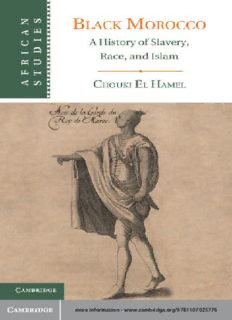
Black Morocco: A History of Slavery, Race, and Islam PDF
Preview Black Morocco: A History of Slavery, Race, and Islam
more information - www.cambridge.org/9781107025776 Black Morocco Black Morocco: A History of Slavery, Race, and Islam chronicles the experiences, identity, and agency of enslaved black people in Morocco from the sixteenth century to the beginning of the twentieth century. Chouki El Hamel argues that we cannot rely solely on Islamic ideol- ogy as the key to explain social relations, particularly the history of black slavery in the Muslim world, for this viewpoint yields an inac- curate historical record of the people, institutions, and social practices of slavery in northwest Africa. El Hamel focuses on black Moroccans’ collective experience beginning with their enslavement as members of the loyal army of Sultan Isma‘il. By the time the sultan died in 1727, the army had become a political force, making and unmaking rulers well into the nineteenth century. The emphasis on the political history of the black army is augmented by a close examination of gender and concu- binage as well as the continuity of black Moroccan identity through the musical and cultural practices of the Gnawa. Chouki El Hamel is an Associate Professor of history at Arizona State University. African Studies The African Studies Series, founded in 1968, is a prestigious series of monographs, general surveys, and textbooks on Africa covering history, political science, anthropology, economics, and ecological and environmental issues. The series seeks to publish work by senior scholars as well as the best new research. EDITORIAL BOARD David Anderson, University of Oxford Catherine Boone, University of Texas at Austin Carolyn Brown, Rutgers University Christopher Clapham, University of Cambridge Michael Gomez, New York University Nancy J. Jacobs, Brown University Richard Roberts, Stanford University David Robinson, Michigan State University Leonardo A. Villalón, University of Florida A list of books in this series will be found at the end of this volume. Black Morocco A History of Slavery, Race, and Islam ChOukI EL hAMEL Arizona State University cambridge university press Cambridge, New York, Melbourne, Madrid, Cape Town, Singapore, São Paulo, Delhi, Mexico City Cambridge University Press 32 Avenue of the Americas, New York, ny 10013-2473, usa www.cambridge.org Information on this title: www.cambridge.org/9781107025776 © Chouki El Hamel 2013 This publication is in copyright. Subject to statutory exception and to the provisions of relevant collective licensing agreements, no reproduction of any part may take place without the written permission of Cambridge University Press. First published 2013 Printed in the United States of America A catalog record for this publication is available from the British Library. Library of Congress Cataloging in Publication data El Hamel, Chouki. Black Morocco : a history of slavery, race, and Islam / Chouki El Hamel. p. cm. – (African studies; 123) Includes bibliographical references and index. ISBN 978-1-107-02577-6 (hardback) 1. Blacks – Morocco – History. 2. Slavery – Morocco – History. 3. Concubinage – Morocco – History. 4. Slavery and Islam – Morocco. 5. Soldiers, Black – Morocco – History. 6. Isma‘il, Sultan of Morocco, d. 1727. 7. Gnawa (Brotherhood) I. Title. dt313.6.b5e5 2013 326.089′96064–dc23 2012023658 ISBN 978-1-107-02577-6 Hardback Cambridge University Press has no responsibility for the persistence or accuracy of URLs for external or third-party Internet Web sites referred to in this publication and does not guarantee that any content on such Web sites is, or will remain, accurate or appropriate. To my mother and all the mothers of Morocco, for paradise lies under their feet! To Malaika and Kanza In memory of the silenced members of the Soudani and the Gania families The executioner kills twice, the second time [by silence]. Elie Wiesel1 We cannot sustain an open and free society if we do not remain mindful of the lessons of the past. Because with ignorance comes indifference. With indifference comes incomprehension. And with incomprehension comes the foundation upon which systems of injustice, exploitation and racism can flourish freely. Michaëlle Jean2 1 Elie Wiesel, The Oath (New York: Random House, 1973), 237. 2 Michaëlle Jean’s speech on the occasion of inaugurating the Harriet Tubman Institute at York University, Toronto, Sunday, March 25, 2007.
